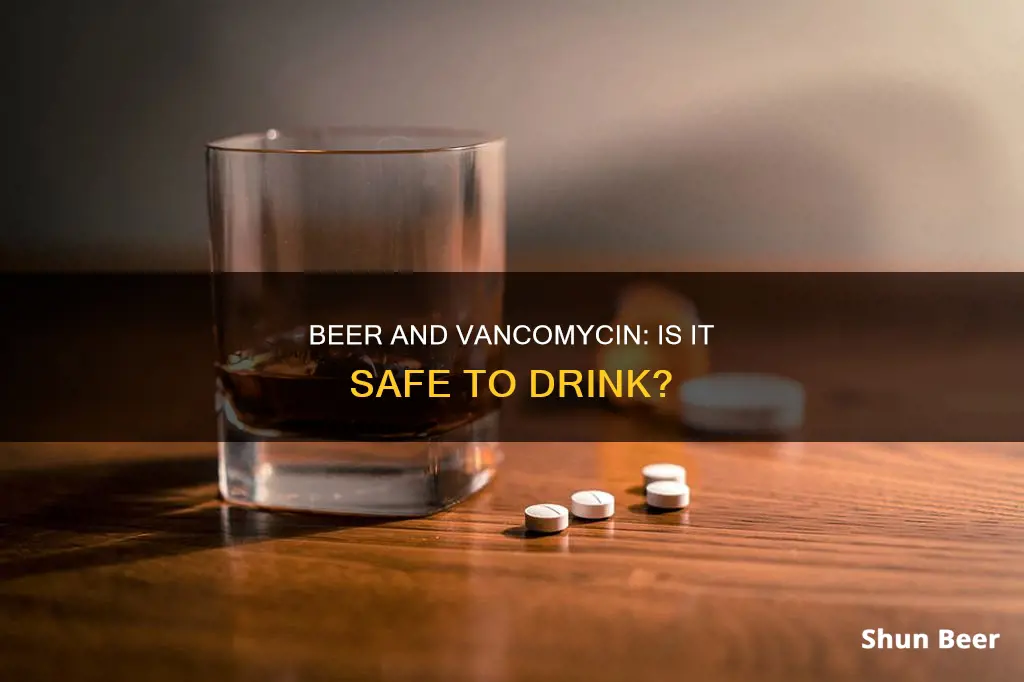
Vancomycin is a prescription medication used to treat severe or serious bacterial infections. It is a glycopeptide antibiotic that works by killing the bacteria that cause infections. While alcohol will not diminish the effectiveness of vancomycin, combining the two can increase the likelihood and severity of side effects such as stomach upset, dizziness, drowsiness, increased heart rate, changes in blood pressure, nausea, and vomiting. Therefore, it is generally recommended to avoid drinking beer or other alcoholic beverages while taking vancomycin until you have completed your antibiotic course and are feeling better.
| Characteristics | Values |
|---|---|
| Alcohol diminishing the effectiveness of Vancomycin | No |
| Alcohol causing similar side effects | Yes |
| Alcohol reducing energy and delaying recovery from illness | Yes |
| Alcohol causing increased heart rate | Yes |
| Alcohol causing changes in blood pressure | Yes |
| Alcohol causing nausea | Yes |
| Alcohol causing vomiting | Yes |
| Alcohol causing gastrointestinal pain and discomfort | Yes |
| Alcohol causing headaches | Yes |
| Alcohol causing redness of the skin | Yes |
| Alcohol causing dizziness | Yes |
| Alcohol causing drowsiness | Yes |
| Alcohol causing liver damage | Yes |
What You'll Learn
- Vancomycin is an antibiotic used to treat bacterial infections
- Alcohol does not diminish the effectiveness of Vancomycin
- Alcohol can increase side effects such as dizziness and drowsiness
- Drinking alcohol while taking antibiotics can prolong recovery
- Alcohol can cause dehydration and affect coordination

Vancomycin is an antibiotic used to treat bacterial infections
Vancomycin is available as an oral solution or an intravenous injection, depending on the type and location of the infection. It is important to note that oral vancomycin is only effective for treating intestinal infections, such as Clostridioides difficile-associated diarrhea (CDAD), pseudomembranous colitis, and Staphylococcal enterocolitis. On the other hand, intravenous vancomycin can treat MRSA infections and other susceptible gram-positive organisms.
Vancomycin works by inhibiting the polymerization of peptidoglycans in the bacterial cell wall, thereby weakening the cell wall and ultimately causing bacterial cell death. It is considered a last-resort medication for treating sepsis and lower respiratory tract, skin, and bone infections caused by Gram-positive bacteria.
While alcohol will not diminish the effectiveness of vancomycin, it is generally recommended to avoid consuming alcohol while taking this antibiotic. This is because alcohol can cause similar side effects to vancomycin, such as stomach upset, dizziness, and drowsiness, and these may be amplified when combined with the medication. Additionally, alcohol can reduce your energy levels and delay your recovery from illness. Therefore, it is advisable to refrain from drinking alcohol until you have completed your course of vancomycin and are feeling better.
Beer and Abs: Is It Possible to Have Both?
You may want to see also

Alcohol does not diminish the effectiveness of Vancomycin
Vancomycin is a glycopeptide antibiotic used to treat certain kinds of bacterial infections in the bowel. It is important to follow the directions on the prescription label and take the medicine at regular intervals.
If you have any questions or concerns about taking Vancomycin, it is best to consult your healthcare provider or pharmacist. They can provide guidance on potential drug interactions and side effects. It is important to be informed and make evidence-based decisions regarding your health.
While alcohol may not directly interfere with the effectiveness of Vancomycin, it is generally advisable to avoid alcohol consumption until you have finished your course of antibiotics and are feeling better. This will help ensure that you give your body the best chance to fight off the infection and recover effectively.
Beer After Best Before Date: Is It Safe to Drink?
You may want to see also

Alcohol can increase side effects such as dizziness and drowsiness
Alcohol can cause side effects similar to those of vancomycin, including stomach upset, dizziness, and drowsiness. When combined with vancomycin, these side effects may be amplified.
Dizziness is a common side effect of vancomycin, affecting balance and spatial orientation. It can cause a spinning sensation, lightheadedness, and faintness, particularly when getting up suddenly from a lying or sitting position. Dizziness can increase the risk of falls and injuries, and it can be dangerous if operating heavy machinery or performing tasks that require coordination and balance.
Drowsiness, or excessive sleepiness, is another possible side effect of vancomycin. It can lead to difficulty staying awake and alert during the day, impacting daily activities and tasks that require concentration and attention, such as driving or operating machinery.
When alcohol is introduced, it acts as a central nervous system depressant, enhancing the sedative effects of vancomycin. This combination can significantly increase feelings of drowsiness and dizziness, impairing an individual's ability to perform everyday tasks safely.
Additionally, alcohol can reduce energy levels and delay recovery from illness. It may slow down the healing process and prolong the time needed to recover from an illness or infection. Therefore, it is generally recommended to avoid alcohol until you have completed your course of antibiotics and are feeling better.
Beer Festivals: A Guide to the Frothy Fun
You may want to see also

Drinking alcohol while taking antibiotics can prolong recovery
Drinking alcohol while taking vancomycin is not advised, as it can prolong recovery from illness. While alcohol does not diminish the effectiveness of vancomycin, it can cause similar side effects such as stomach upset, dizziness, and drowsiness, as well as dehydration, poor sleep, and reduced energy. These side effects may be amplified when combined with vancomycin, and alcohol can further delay recovery by interfering with sleep patterns and the absorption of vital nutrients.
Healthcare professionals generally advise against drinking alcohol while taking antibiotics. Alcohol can negatively impact liver function, digestion, and heart health, and it can weaken the immune system, making it easier to fall ill. Therefore, consuming alcohol while sick can slow down the recovery process.
It is best to avoid alcohol until you have completed your course of antibiotics and are feeling better. This is especially important when taking certain antibiotics such as metronidazole and tinidazole, which can cause extreme nausea and vomiting if combined with alcohol. For other antibiotics, it is generally recommended to hold off on drinking until your condition improves. However, always follow the advice of your healthcare provider regarding alcohol consumption while taking antibiotics, as they can provide personalized guidance based on your specific circumstances.
If you are taking vancomycin, it is important to follow the directions on your prescription label and consult your healthcare provider or pharmacist if you have any questions or concerns about alcohol consumption. They can provide tailored advice based on your age, overall health, and the specifics of your medication regimen.
Good Friday Beer: Is It Allowed?
You may want to see also

Alcohol can cause dehydration and affect coordination
Alcohol is a diuretic, which means it increases urine output. It does this by suppressing the production of vasopressin, a hormone that helps regulate fluid balance in the body. Normally, vasopressin sends signals from the brain to the kidneys, telling them how much fluid to remove from the body in the form of urine. When alcohol is consumed, the suppression of this hormone causes the kidneys to remove extra fluids, resulting in increased urination. This can lead to dehydration if not enough water is consumed along with alcohol.
In addition to water loss, alcohol consumption can also lead to an electrolyte imbalance, particularly a decrease in sodium levels. This is because alcohol intake is typically low in solute (protein and salt) compared to free water intake. Under normal conditions, the kidneys require solute to excrete free water. However, when there is an insufficient amount of solute, the kidneys retain more free water, leading to a dilution of sodium concentration in the blood.
Drinking alcohol on an empty stomach can amplify the effects of dehydration. This is because there are no foods or fluids to dilute the alcohol, so its effects are more potent and can be felt sooner. Additionally, drinking on an empty stomach can cause long-term damage to the liver, which is responsible for metabolizing alcohol. Heavy drinking over extended periods can lead to irreversible liver damage.
As alcohol accumulates in the body, it can affect coordination and balance. With higher blood alcohol levels, individuals may experience loss of coordination, decreased balance, changes in speech, and slower reaction times. At very high levels, alcohol can cause severe loss of control over body movements, balance, and coordination, as well as confusion, disorientation, nausea, vomiting, and memory loss.
It is important to note that while alcohol may not diminish the effectiveness of vancomycin, an antibiotic used to treat certain bacterial infections in the bowel, combining the two can increase the risk of similar side effects such as stomach upset, dizziness, and drowsiness. Therefore, it may be best to avoid alcohol until the completion of the antibiotic treatment and recovery from illness.
Drinking Beer at the University of Delaware: What's Allowed?
You may want to see also
Frequently asked questions
Alcohol will not diminish the effectiveness of vancomycin, but it can cause similar side effects, such as stomach upset, dizziness and drowsiness. These side effects may be amplified when combined with vancomycin. It is recommended to avoid alcohol until you have finished your antibiotics and are feeling better.
Vancomycin is a prescription medication used to treat severe or serious infections caused by certain types of bacteria. It belongs to a group of drugs called glycopeptide antibiotics, which work by killing the bacteria that cause infections.
The most common side effect of oral vancomycin is an upset stomach. Other common side effects include lightheadedness or faintness, itching, difficulty breathing, or a rash on the face, neck, chest, or upper arms or legs. Vancomycin can also cause dizziness.







